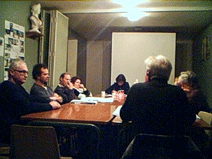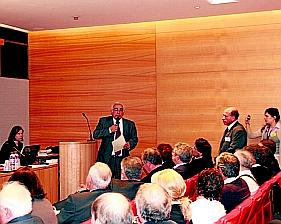The future of the Castle. |
Harry Morskate | 10
december 2010 |
| M.
Fleutiaux, owner of the castle, held a passionate presentation to the
Council on Friday, December 3. His idea was to establish, with the
municipality, a joint venture with the aim to set up a number of
activities around the castle and the old village. The municipality
would want to include investing in a «maison
de formation» and a «Cafe
de
Pays» and purchasing some land. M. Fleutiaux would
contribute
part of his private property, but with the reservation that it remained
under his control. Unfortunately, the objective and the true concept were not clear. It also lacked a concrete financial plan. But does the proposition of setting up a business together with the municipality offer the prospect of good cooperation, the preservation of the castle and, more importantly, a healthy operation? In the Midi Libre dated April 21, 2010, we read: «The Council members return from the Senate with their price. These are the local elected councillors, well pleased with their work and enthusiastic -which means they are even more motivated than ever- who have returned to their 'village' after their Paris escapade and after receiving marks of honor along with the title of laureate of the 21st municipalities' competition for the restoration work currently undertaken at the castle-hamlet of Dio...» But no enthusiasm or motivation was in sight. On the contrary, a  minimal positive
attitude, the first prerequisite for good cooperation, was lacking.
Some comments even witnessed a total lack of respect towards the
enthusiastic owner of the castle. minimal positive
attitude, the first prerequisite for good cooperation, was lacking.
Some comments even witnessed a total lack of respect towards the
enthusiastic owner of the castle.This attitude of the council stands in stark contrast to the acceptance of the price by the municipality. In Paris, the entire council sat in the forefront. This, while all four special guests, M. Fleutiaux, owner of the castle and project coordinator, M. Castan, Director of the united municipalities, M. Viala, regional delegate of the "Fondation du Patrimoine", and Pailhes, Conseiller General, were not present. They did not agree with this wasteful expense and waste of tax money so that, for this reason among others, they did not go to Paris. |
That brings us to the important question of
whether our community is a good partner for M. Fleutiaux, and whether
it should take part in his initiatives or merely facilitate them. It is known that the support for even more money allocated to the castle and levied from the  people
is not widespread. The municipality is poorly
managed and is in financial trouble. There is no policy, the
organization is poor and the community is lacking basic infrastructure
required by law. people
is not widespread. The municipality is poorly
managed and is in financial trouble. There is no policy, the
organization is poor and the community is lacking basic infrastructure
required by law.These are enough arguments not to cooperate in the future with the municipality as an entrepreneur. That would certainly not become a success, and therefore, nobody would benefit financially from it. Unemployment in our department, the Herault, is consistantly and terrifyingly high: 13,1% in 2010 overall, 9,7% in rural areas. This is the second highest percentage in the whole of France. The department lacks employment. The key to a solution of the unemployment is the insight that the consumers are the real employers. In a region where unemployment is high, revenues are generally lower. That is certainly the case in the Herault. It is therefore almost impossible for a healthy operation 'Castle' to succeed if it is based solely on local activities. Simply because the money is missing in our region. This means that there might be a better solution if we look elsewhere and import 'employment'. Precisely here the castle with the hamlet offers a good opportunity. There are excellent flights and TGV connections to prosperous regions and European countries. And the Herault and our community have much to offer to visitors! For example, by developing a concept for the castle and the village to be used as a conference and meeting centre, these visitors would generate employment in services. That would certainly provide more chance to operate a healthy venture, and more importantly, to contribute to employment in our community. |
|
La
commune de DIO ET VALQUIÈRES, située dans le
département de
l'HERAULT, au pied des Cévennes, réunie
trois hameaux DIO, VALQUIÈRES et VERNAZOUBRES,
d'une
importance quasi égale, et abrite 139 habitants sur une
superficie de 1.877 hectares. La Gazette
de Dio et Valquières
est une initiative de citoyens concernés qui
surveillent de façon critique la politique
municipale.
Gazette
de Dio et Valquières
|



